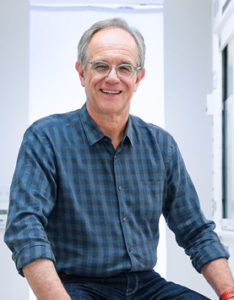by Buck Institute
November 15, 2018 . BLOG
Longevity: Is it all in the family?
By Eric Verdin, President and CEO of the Buck Institute
 For many of us, our parents have given us a lot. And from a genetics standpoint, that couldn’t be truer. From our hair color to our height, and our metabolism to our microbiome, our genetics influence pretty much everything about our biology and our lives.
For many of us, our parents have given us a lot. And from a genetics standpoint, that couldn’t be truer. From our hair color to our height, and our metabolism to our microbiome, our genetics influence pretty much everything about our biology and our lives.
A widely reported study published in the journal Age and Aging by Aladdin Shadyab and Andrea LaCroix of UCSD School of Medicine, and colleagues, found that parental longevity strongly predicted healthy aging in women. The study followed a national cohort of over 22,000 postmenopausal women participating in the Women’s Health Initiative and determined that, when compared to women whose mothers had only lived into their 70s, women who had mothers that lived past 90 years of age had a 25% increased likelihood of living into their 90s. Remarkably, this increase in lifespan was also associated with an increase in healthspan, defined as the healthy years of life. Indeed, women who had mothers that lived past 90 not only lived longer but also showed a decreased likelihood of age-related diseases including coronary heart disease, stroke, cancer, and diabetes. Interestingly, paternal age alone didn’t predict healthy aging of daughters, but when both parents had lived into their 90s, women saw a 38% increase in achieving longer, healthier aging.
These results follow up on several earlier studies demonstrating the connection between parental age and healthy aging of offspring. The pioneering New England Centenarian Study showed a decade ago that children of centenarians had a 78% reduced risk of myocardial infarction, 83% lower risk of stroke, and 86% lower risk of diabetes. More recently, a British study of over 186,000 middle-to-older aged adults found that the risk of cardiovascular disease and to a lesser extent, cancer, was inversely correlated with parental attained-age.
These studies invariably bring up the age-old (pun intended) question of nature vs. nurture. Is it simply that parents with healthy habits live longer and teach their children a similarly healthy lifestyle? When the UCSD study controlled for confounding factors such as income, education, activity level, smoking, and obesity, they saw that the association between parental lifespan and offspring healthspan remained. This tells us that lifestyle and environmental factors are likely not the only influencers of healthy aging. Studies performed in identical twins (which share 100% of genetic traits) have similarly demonstrated that genetics influence a variety of age-related traits including cognitive function, motor function, and some cardiovascular risk factors. From these types of familial studies, researchers have determined that approximately 10% (or less) of the variation in human longevity is due to genetic factors. Genome-wide association studies are currently being pursued to help us identify some of the genetic traits associated with healthy aging and lifespan.
If genetics contribute less than 10% to longevity, that means the remaining 90% is in our hands and can be influenced by our environment and lifestyle choices.
One striking illustration of this is the population of Okinawan immigrants in Brazil. Okinawa, famously known as a longevity “blue zone”, has an average life expectancy of just over 81 years. However, when approximately 100,000 Okinawans moved to Brazil in the 1900s and adopted a Brazilian diet and lifestyle, their average lifespan and the lifespan of their children dropped about 17 years.
As we can’t change our genetics, passing down healthy habits may be the best place to start. In the UCSD and other studies, offspring of long-lived parents were also more likely to incorporate healthy eating and physical activity into their daily lives and were less likely to exhibit signs of depression. I will further discuss some of the environmental and lifestyle factors that contribute to healthy aging and longevity in future blog posts. In the end, it seems the greatest gift we may be able to give our children is to live longer and healthier ourselves.

SHARE